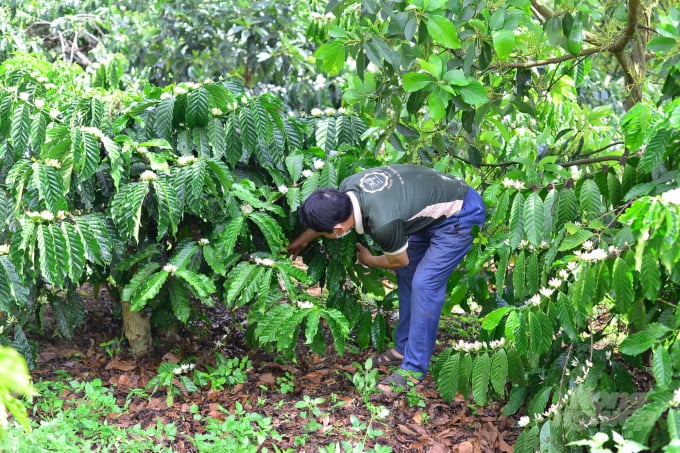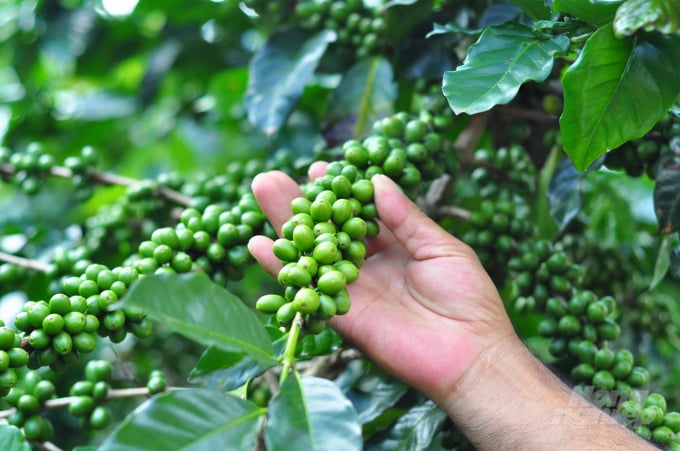May 31, 2025 | 00:43 GMT +7
May 31, 2025 | 00:43 GMT +7
Hotline: 0913.378.918
May 31, 2025 | 00:43 GMT +7
Hotline: 0913.378.918
When the sun and wind of mid-March peak dry season come rushing in, many coffee gardens in the land of Di Linh district are usually destined to suffer. However, the coffee garden of Mr. Do Duy Tung (village 8, Hoa Bac commune, Di Linh district, Lam Dong) still looks full of life. The young fruits begin to form beautiful long lines on the branches.
As shared by Mr. Tung, in recent years the price of agro-inputs for coffee production had constantly increased while the price of products is continuously in decline, putting the family into many difficult situations. In search of a way to reduce production costs, he did some research on organic production and learned about the self-compost process.

"In the past my family used inorganic fertilizers which cost approximately VND 40 million/ha/year. The application of inorganic fertilizers also led to an increase in labor costs" - Mr. Tung. Photo: Minh Hau.
With the support of agricultural officials, in 2020 Mr. Do Duy Tung began organic composting to fertilize his garden. Mr. Tung purchased soybean meal, probiotics and fish manure from fish farms in the area with the ambition to create a suitable fertilizer source that meets standard nutritional criteria. "This type of fertilizer helps plants absorb nutritions well and thrive. Thanks to this method the family has saved 50% of the fertilizer cost compared to inorganic fertilizers."
In a similar manner, Mr. Bach Van Pha in Tan Van commune, Lam Ha district, Lam Dong also found a "lifebuoy" by self-composting to reduce input costs for his family's 5.7 ha of coffee, saving hundreds of millions of dong on fertilizer each year.
His family used to depend on chemical fertilizers to grow coffee. In the first few crops the coffee grew strong and well, but later on the soil became more and more discolored and hardened, coffee in the garden also gradually withered, and the productivity and quality decreased severely.
After some research and studies, Mr. Pha decided to use coffee husks, agricultural by-products combined with Trichoderma and sugarcane to self-compost.

Mr. Pha composting organic fertilizers for the crops on his own. Photo: Minh Hau.
“Composting organic fertilizer by myself is difficult at first since I have to adhere to the mixing formula and be precise on the time. However after a few batches of compost, I slowly mastered the craft and didn't need to look at books or notes anymore," said Mr. Pha.
Along with the use of self-composting organic fertilizers, Mr. Tung's family now focuses on developing the garden in the organic direction.
“Developing the organic coffee model takes a lot of effort at the beginning stage due to a sharp decrease in productivity, but the good result gradually shows itself over time. In the 2020 crop my family only yielded 6 tons/ha, while inorganic fertilizer coffee was 8 - 10 tons/ha. In the 2021 crop, the yield increased to 8 tons/ha, and now I’m expecting an output of 10 tons/ha in the 2022 crop.”
Mr. Tung's family, together with other households in the village, has established an organic coffee cooperative group with a total cultivation area of 5.6 ha. The members have built a buffer zone and developed the model according to organic standards such as zero chemical pesticides and fertilizers. "Although our cooperative group is fresh and young, our clean coffee products have been sought out by many purchasing hubs in Hanoi and Ho Chi Minh City, offering to underwrite at a price VND 12,000 higher than the market price."

Organic coffee produced by Mr. Tung's family holds superiority in terms of selling price on the market compared to other common types of coffee products. Photo: Minh Hau.
Green coffee which is produced following the conventional model is currently around VND 40,000 - 41,000/kg on the market while organic coffee produced by the households is VND 52,000 - 53,000/kg.
According to Mr. Bach Van Pha, many households in Lam Ha district still produce coffee the old way: abusive use of inorganic fertilizers and toxic pesticides. “This prolonged behavior soon leads to soil degradation and other negative impacts on the water and earth environment, and that also goes for the health of producers and consumers.”
Translated by Samuel Pham

(VAN) Several scientists and farmers are experimenting with soil treatment in some key durian-growing regions such as Cai Lay (Tien Giang), Dak Song, Gia Nghia, and Dak R’lap (Dak Nong).
/2025/05/25/4127-3-073637_820.jpg)
(VAN) Thanks to the promotion from an FAO-implemented project, vegetable production in greenhouses in Moc Chau has seen strong development, from 1.5 hectares in 2021 to nearly 50 hectares in 2024.

(VAN) FAO has recently supported USD 140,000 to implement the project 'Risk mitigation human-animal interface risks through disease control initiatives in pig farming.'

(VAN) The People's Committee of Tra Vinh province has approved an adjustment to the investment policy for the Green Hydrogen Plant project, increasing its area to approximately 52.76 hectares.
![Reducing emissions from rice fields: [2] Farmers’ commitment to the soil](https://t.ex-cdn.com/nongnghiepmoitruong.vn/608w/files/news/2025/05/05/dsc08881jpg-nongnghiep-140632.jpg)
(VAN) Clean rice cultivation model in Thuong Tan commune, Bac Tan Uyen district, is assisting local residents in achieving sustainable agriculture by substantially reducing costs, increasing productivity, and protecting the environment.

(VAN) At the conference to disseminate Resolution No. 68, AgriS introduced its digital agricultural ecosystem and reaffirmed its commitment to accompanying the Government in promoting private sector development and sustainable agriculture.

(VAN) 'Blue Ocean - Blue Foods' initiative is designed to restore marine ecosystems and establish sustainable livelihoods for local communities by cultivating a minimum of 1,000 hectares of cottonii seaweed in the first three years.